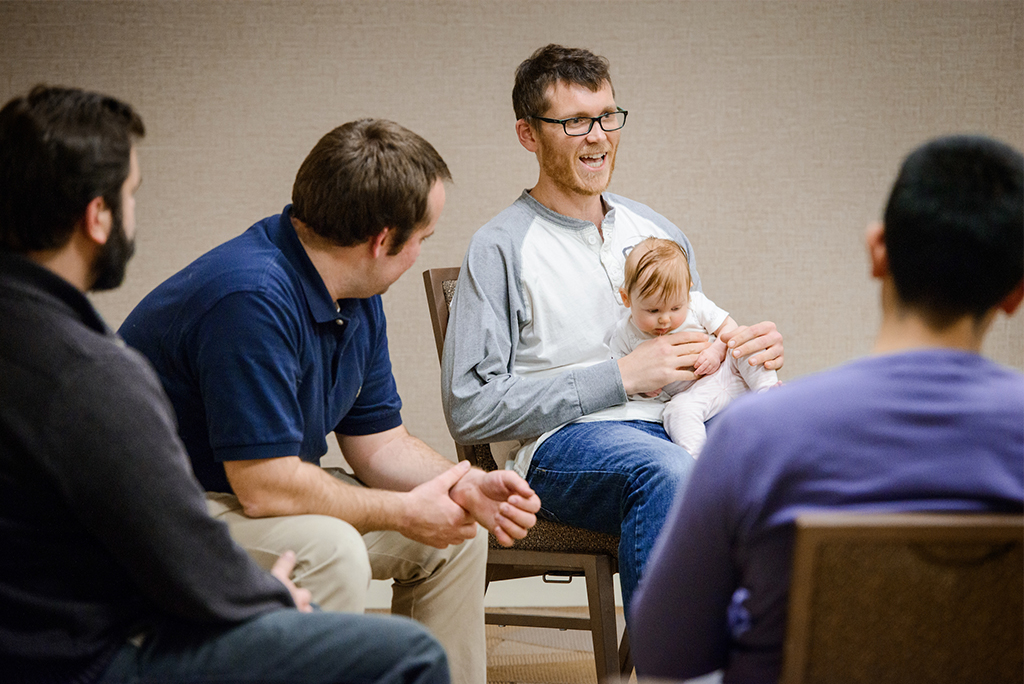By Paula Schlueter Ross
Early last month, a group of St. Louis-area single and married pastors, with their wives, got together to share the joys and challenges of the pastors’ still-new ministries.
Sitting on chairs arranged in two circles — six men in one, four women in the other — they spoke of how uplifting, although stressful at times, their just-ended Advent and Christmas observances had been.
They discussed the joys of congregation dinners and worship services. The happiness of family traditions and having their parents in town.
And, on the flip side, their worry over sick family members when they had to be at church to lead worship. The long days with seemingly back-to-back prayer services, funerals, phone calls and meetings. Wives serving as “single parents” when their pastor husbands are called away.
Even without all the hustle-and-bustle of holidays, it’s often a tall order for new pastors and their wives to adapt to a new congregation, with its own special needs and customs.
Thankfully, these new pastors have a support system that’s helping to ease the sometimes rocky transition from seminary to congregation: the Post-Seminary Applied Learning and Support (PALS) program. PALS brings the pastors and their wives — fresh from seminary life — together in small groups for the first three years of ministry to share experiences, learn from relevant study topics and encourage one another.
‘A safe place’
Begun in 1998, PALS is “most definitely a valuable LCMS program,” notes the Rev. Dr. James A. Baneck, executive director of LCMS Pastoral Ministry.
In those first post-seminary years, Baneck says, new pastors and their families typically transition “from a close circle of friends” on campus, “to feeling isolated and lonely” in an unfamiliar city; “from being a student, to taking on all the responsibilities of leading a church”; “from a network of supportive professors, to building all new relationships with members and church leaders they’ve never met before.”
PALS, he says, “is an integral part of this transition” because its goal of helping pastors “establish a solid foundation” also sets them up “for a very successful, faithful and fulfilling ministry for years to come.”
That’s good for pastors and “of great benefit to the church-at-large,” he adds.
The Rev. Andy and Nikki Becker have seen the benefits of PALS firsthand, both as participants in the early years of ministry, and today as facilitators for a PALS group that gets together three times a year.
The meetings provide “a safe place to talk about all of the things involved in pastoral life — the large and small, good and difficult,” says Andy, associate pastor of St. John’s Lutheran Church in Arnold, Mo. “It’s a place where we can share, and where we can pray for and support others in their ministry.”
And, he adds, it’s “very intentionally not just for the pastor, but for the pastor and pastor’s wife.”
Including wives is a necessary part of the program, says Nikki Becker, since “transitioning from seminary to any ministry setting is a huge shift for the whole family.”
Moreover, “if PALS were only for the pastors, this could be seen as another meeting when he can’t be with his family. Getting support from PALS as a couple is good for the marriage.”
Having discussions separate from their husbands also is valuable, she says, so that the women can address topics that pertain to them, such as “single-parenting in the pew.”
The smaller, more intimate setting encourages participants to “better open up, developing strong relationships with their sisters in Christ.”
PALS, she adds, “is a good reminder that you and your spouse are both learning and adjusting” in the first years of his ministry. “The support focuses on godly living, and growing together as a couple is something every marriage should do.”
Couples are encouraged to bring their children to the meetings, too, and babysitting is typically provided.
Gaby Espinosa, whose husband, “AJ,” has served since 2015 as assistant pastor of Messiah Lutheran Church in St. Louis, said she wasn’t sure what to expect from PALS, but is glad she’s part of the group.
“It’s nice to have a safe place to talk about issues that one may normally not feel free or comfortable discussing elsewhere,” she told Reporter.
AJ agrees, saying he enjoys “the ‘unplugged’ conversation and the break from routine.”
“It’s been helpful to learn from the experiences of the other pastors and wives in our PALS group,” he said. “Gaby and I definitely relate with them, and our group functions as something of a mirror, or sounding board, to give us perspective, as well as comfort.”
Like their pastor husbands, pastors’ wives have their own set of challenges when they arrive at a new congregation, Gaby notes.
“The pastor’s wife role is not defined and changes with each congregation,” she says. “A big challenge is defining that role for yourself and learning how your specific interests and talents fit into your church life.”
She admits she’s “still figuring out how my strengths fit in, especially with a toddler to take care of!”
Gaby Espinosa says she considers her fellow PALS-group members as friends, and enjoys seeing them “and hearing about how their lives — church and personal — have progressed.”
She would “absolutely” encourage other new pastors and their wives to get involved in PALS.
“The group, especially the women, have helped me not feel so lonely,” she says. “I’ve always known that there are plenty of other pastors’ wives, but here I get to interact and share with them in person and feel truly cared for.”
Paula Schlueter Ross (paula.ross@lcms.org) is manager of News and Information Services for LCMS Communications.
Posted Feb. 5, 2018





